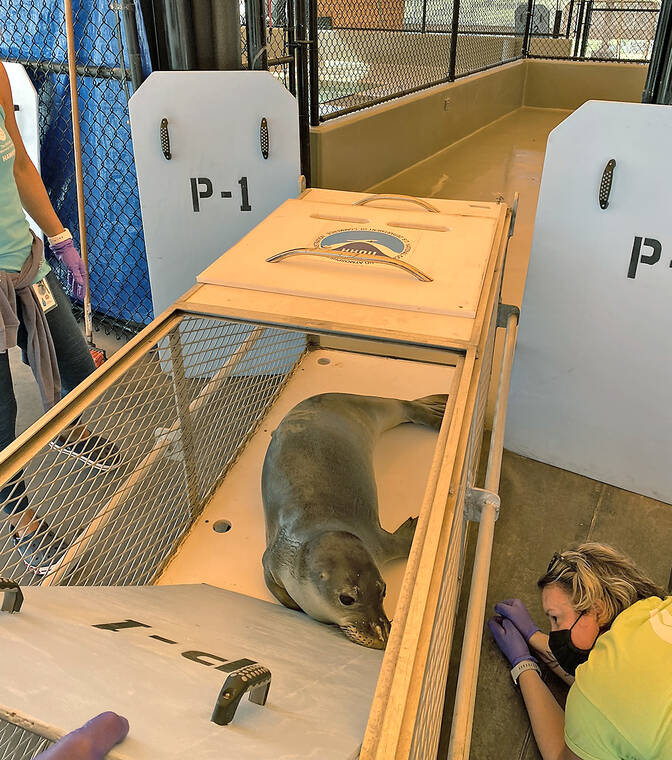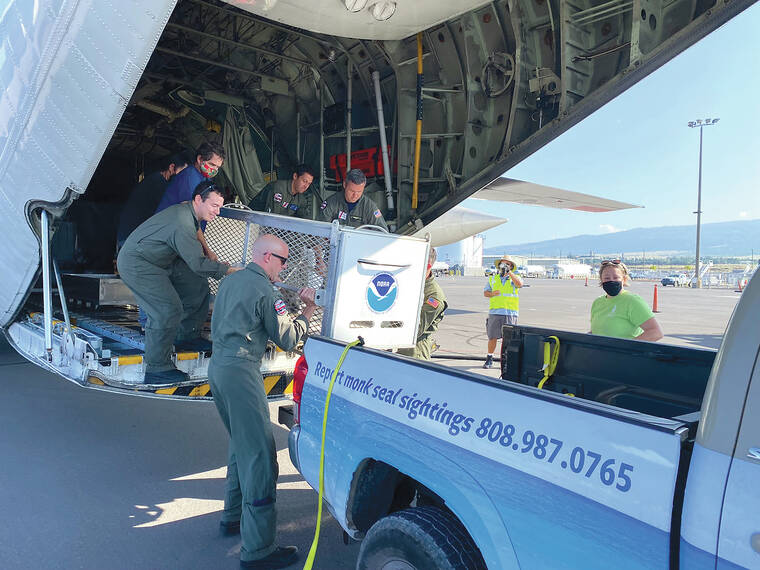A new patient is receiving care at the world’s largest marine mammal hospital in Kailua-Kona.
The Marine Mammal Center recently admitted an endangered Hawaiian monk seal suffering from fishing gear ingestion and moderate malnutrition to its Ke Kai Ola facility within the Natural Energy Laboratory of Hawaii Authority. The juvenile male monk seal, known by researchers as N2, was listed Monday in stable condition.
“The ingested fishing gear clearly impacted this monk seal’s condition and we’re hopeful thanks to a successful procedure, that this animal is on the road to a full recovery,” said Sophie Whoriskey, the center’s Hawaiian Monk Seal Conservation Veterinarian. “We’re proud to be able to support patients like N2 as the only partner organization permitted by NOAA Fisheries to treat and rehabilitate Hawaiian monk seals. We will do everything we can to give this endangered animal a second chance to return to his ocean home.”
Hawaiian monk seals suffer from very high rates of entanglement in ocean trash and fishing gear, as well as ingestion of fishing hooks, according to the center.
After arriving Friday from Oahu, the center’s experts stabilized the animal before performing a successful procedure to remove an ingested hook from his stomach. During the procedure, the team also took a series of blood samples and a fecal sample for further analysis.
The center’s veterinary team noted that N2 was moderately malnourished but alert and quiet.
The team plans to slowly begin offering sustainably caught live and dead fish feedings as well as subcutaneous fluids to help boost the seal’s nutritional status and hydration in the coming days.
A COMPLEX RESCUE ON OAHU
N2 made the trip from Oahu to the center’s hospital thanks to a combined effort from local responders.
On Jan. 22, NOAA received a report via of a seal on the Ka Iwi Coastline with a wire fishing leader and a swivel hanging from its mouth. NOAA Fisheries staff responded to evaluate the seal’s condition, but it was not possible to attempt to remove the gear at the time due to logistical constraints.
The Hawaii Marine Animal Response (HMAR) then deployed 13 people who worked for 54 hours over five days to find the seal. N2 was ultimately located Thursday at Hanauma Bay. Trained experts from NOAA and HMAR performed a successful rescue that day, and the response team transported the seal to NOAA’s Inouye Regional Center.
Due to the seal’s condition and need for long term rehabilitation after the endoscopy procedure, NOAA initiated travel plans to bring the seal to The Marine Mammal Center’s hospital on Hawaii Island. The U.S. Coast Guard airlifted the seal on Friday via a C-130 aircraft, as part of the federal agency’s training operations.
Since 2014, the center has rehabilitated and released 36 monk seals, most of which have been rescued from and returned to the Northwestern Hawaiian Islands as part of the center’s partnership with NOAA Fisheries, utilizing resources in the area to identify seals in need, rescue and rehabilitate them, and give them a second chance at life.
The public should keep a safe distance from monk seals and report sightings on Hawaii Island to the center’s response team at the 24-hour hotline at (808) 987-0765.
Report hooked, stranded, or entangled monk seals to the NOAA Fisheries statewide toll-free hotline at (888) 256-9840.


